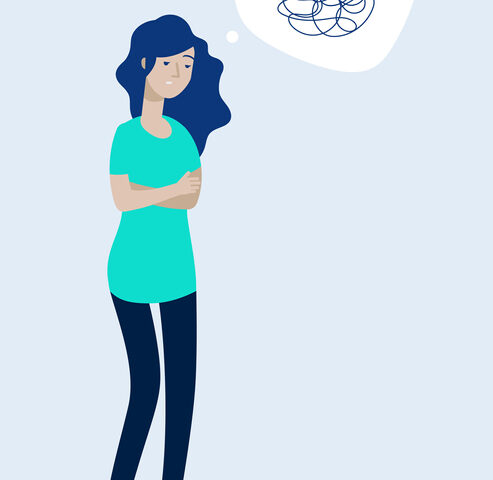Can Yoga Help With Addiction Recovery?
October 24, 2021
Healing by Expression: The Power of Experiential Therapy
October 29, 2021Does Relapse Erase Your Progress in Addiction Recovery?
Recovering from addiction is a process, and it is important to take the time to learn how to cope with the triggers and the roots of the addiction. For those in recovery, sobriety is a choice they will have to make every day. The possibility of relapse after recovery is very real, and if a person experiences a relapse, it is important to know that they can still recover.
Many opinions see relapse as a failure, an erasure of all the person’s hard work to get sober. This is simply not true. Understanding the role relapse plays in recovery is essential. If a relapse does occur, the most important thing a person can do is to learn from it and use it as motivation to maintain sobriety moving forward.
Addiction: A Chronic Disease
Addiction is defined by multiple organizations and medical associations, such as the American Society of Addiction Medicine and the American Medical Association, as a chronic disease. It is defined as chronic because it permanently alters the brain’s reward system. This means that even after someone has lived many years of sobriety, they still have the risk of relapsing and returning to the substance.
Substance Use and the Brain
Addiction alters the way the brain reacts to pleasurable activities such as sex, hunger, and thirst. Humans have a reward circuit that involves motivation and memory. The reward circuit helps sustain life by causing the individual to continue indulging in pleasurable activities.
When substances are consumed, the brain releases higher amounts of these pleasure chemicals. This causes the person to consume more of the substance, and the more of the substance they consume, the more their cravings increase. Over time, the person may develop stronger cravings and interest in these substances that they no longer crave satisfying healthier pleasures, such as hunger, thirst, and sex. Addiction progressively gets worse as the person struggling with substance use begins caring more about their next fix rather than their other needs.
Even when a person undergoes detox and addiction treatment and has been sober for a long time, those brain alterations remain. Because of these alterations, a person in recovery may be easily triggered by the things that caused their addiction. However, a person can avoid their triggers through proper recovery techniques and healthy coping mechanisms.
Potential Causes of Relapse
Triggers, also known as environmental and physical cues associated with substance use, are commonly what bring people back to a substance. While there are specific triggers for each person, there are also common ones that can be classified as potential causes of relapse. Identifying one’s triggers is an important part of the recovery process.
Common Triggers
- Stress
- Mental/physical illness
- HALT (Hungry, Angry, Lonely, Tired)
- Social events/places that remind you of drug abuse
- Your job
- Isolation
- Emotions
- Relationships
- Lack of a support system
In treatment, coping mechanisms are taught to help people deal with challenging situations. These strategies are vital and can be used even years after treatment to help avoid triggers.
What to Do After a Relapse
If you relapse after treatment while living in sobriety, there are things you can do to help yourself. These actions will help you prevent future relapses, and the experience will teach you how to better handle another relapse if it were to happen. If you feel you may be prone to relapse, please take immediate action to help prevent it from occurring. Some actions to take include:
#1. Avoid Triggers: If you are exposed to triggers, try to remove yourself from the situation. Being surrounded by unhealthy situations or environments after a relapse can increase your cravings. Separate yourself from them as much as possible.
#2. Reach Out: Tell someone you trust immediately after your relapse. Go to a trusted family member, friend, or mental health professional to lean on for support. This will keep you from isolating and allow your community to support you at your most critical moments.
#3. Set Boundaries: Put in place some healthy boundaries that will keep you away from triggers, such as people, places, and other harmful situations. Put distance between those that encourage your substance use and stay near those that are sober and support your sobriety.
#4. Have a Relapse Prevention Plan: Now that you have gone through the relapse and are working on staying sober, come up with a plan to deal with possible triggers in the future. Identify triggers and write down coping mechanisms to deal with them as they come, including the number of support groups and hotlines for you to contact.
The important thing to remember about relapse is it is not an end to sobriety. Substance use disorders are chronic diseases, progressing over time the more one uses. Once the brain is altered by substance use, it stays that way. This means that even those that have been sober for years have the potential to relapse. The important thing to remember is that relapse does not erase all of your progress; rather, it teaches you how to overcome difficult situations as they come. Identify your triggers and create a relapse prevention plan to help in case there’s a next time. If you or a loved one have suffered from a relapse and need help, we are here for you. At The Kimberly Center, we can help you pick yourself up again and get back on your road to sobriety. Contact us at (855) 452-3683. Our team of professionals is dedicated to helping you live a happier and more productive life.



